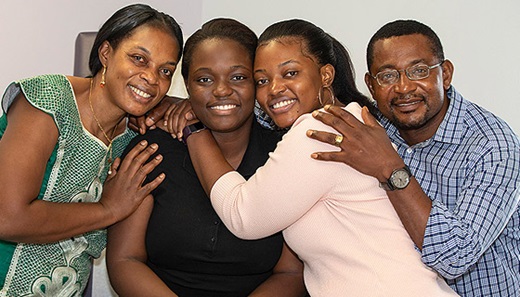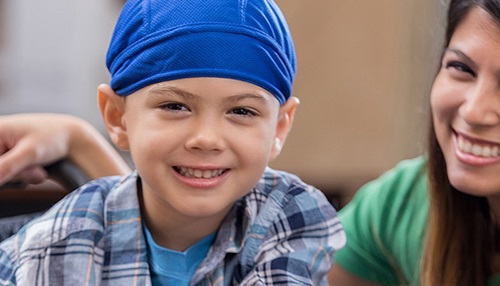Patient Story
Acute Lymphoblastic Leukemia: Dominica’s Story
Patient Story Highlights
- Dominica, a 16-year-old from Cameroon, battled acute lymphoblastic leukemia (ALL) while facing limited healthcare resources in her home country.
- After her diagnosis, Dominica and her family struggled to pay for her expensive treatments and navigated political strife that threatened their safety.
- Dominica and her family eventually moved to the United States, where she received high-quality care at Johns Hopkins All Children's Outpatient Care in Tampa.
- Under Dr. Jessica Wishnew's treatment plan, Dominica responded well to an intense chemotherapy regimen, and she is now enjoying high school and looking forward to helping others in need.

Sixteen-year-old Dominica glows with good health and the optimism of youth.
After a diagnosis of acute lymphoblastic leukemia (ALL) in 2015, she now has completed her cancer treatment and is ready to take on the world.
Although it’s not that unusual for a child to be winning a battle with ALL, what does make Dominica unique is how she got here.
Tucked away in a quiet room in Johns Hopkins All Children’s Outpatient Care, Tampa, she and her family begin to share their remarkable and harrowing story.
Dominica holds out a handful of photos—each one of them a profile in courage.
The child in the photos is alone in a dingy room, lying on a bed no bigger than a camp cot, the mattress barely 2 inches thick. She is bald, with sores covering her head. She looks gaunt and sick.
The photos are of Dominica, three years ago, in a hospital in her homeland—Cameroon, Africa. With only limited health care available, Dominica would suffer through chemotherapy treatments for months, while watching young patients who had become her friends die all around her.
“I kept thinking it was me,” Dominica says. “I told my father, ‘Everyone is looking at me to see when I will take my turn. I thought there was something about me that was causing so many to die.”
The fact that Dominica would even get access at all to those first chemo treatments was something close to a miracle. She and her family are from the northwest region of Cameroon where there are no major medical institutions, and only the most basic care.
When Dominica first began experiencing debilitating body pains, her father took her to several area hospitals, but they did not discover her cancer. They simply gave her pain meds and sent her home.
With no solutions, Dominica’s father, Zephania, resorted to bringing her to churches, so that pastors and parishioners could pray for her healing. But her pain kept increasing.
Desperate for answers for his ailing child, he even took her to witchdoctors. They had her drink several concoctions, including a mysterious raw egg mixture with powdered herbs.
“I did not feel good about that,” Dominica says.
“There is a lot of belief in witchcraft in my country,” says Vivianne, Dominica’s mother. “So when you’re being treated for an illness and don’t get better, some relate that to witchcraft.”
Finally, a relative in the capitol city of Yaoundé helped get Dominica into a hospital there for testing. The results took two weeks. The diagnosis came in an email with a one-word explanation: “Leukemia.”
How would the family pay for her care? There was no health insurance. Dominica’s parents are educated as teachers, and together they brought in around $600 dollars a month, a better wage than most Cameroonians make. But it was still far too little for the $1,500 per treatment the hospital required.
Funds from family members and friends helped with Dominica’s initial chemo treatments, but she would endure many painful and frightening experiences, including spinal taps with no anesthesia, high fevers, and on two occasions, she lapsed into a diabetic coma. She was given insulin after that.
“Dominica would call me and say, ‘Mom, pray for me. Today may be my own day to die,” says her mom.
Dominica had to speak with her mother over the phone because her mom wasn’t actually there in Cameroon when her daughter got sick. She was here in the Tampa Bay area with relatives … which brings us to the other battle that was being waged in Dominica’s world—the one on the streets of Cameroon.
Political strife between English-speaking and French-speaking Cameroonians had been reaching a boiling point. There was violence in the streets. The schools closed. Killings were common. As a teacher who had spoken out on the side of the English-speaking citizens, Vivianne felt she was in danger of being targeted. She traveled here to the United States, seeking political asylum.
Vivianne’s hope was to bring the rest of her family here—to safety—as soon as possible. But when her child got sick, it became more critical than ever to get her here—to save her life.
Dominica would finally make it to Tampa in February of 2016. With some lucky twists of fate and help from an organization called the Children's Dream Fund, the rest of the family would come over later.
“Everything was better here, even the spinal taps. It’s so different, not painful, and the support. They treat you like family."
Dominica
Dominica first had a few chemotherapy treatments at a Miami hospital, and soon arranged to continue treatments closer to home, at Johns Hopkins All Children’s Outpatient Care, Tampa.
For Dominica’s doctor, Jessica Wishnew, M.D., the challenge was an unusual one. How could she effectively treat a patient with so little known medical history to work with?
“We didn’t know what her white cell blood count was at diagnosis,” Wishnew says. “We didn’t know any details about her particular leukemia cells, so it was interesting trying to put the pieces of this puzzle together.”
Wishnew chose a high-risk protocol, with an intense chemotherapy regimen.
Dominica responded beautifully. She got stronger.
“Everything was better here, even the spinal taps. It’s so different, not painful,” Dominica says. “And the support. They treat you like family.”
“It was by some twist of fate that she ever even came to be sitting in our clinic,” says Isaac Hauk, A.P.P., who treated her at the Outpatient Care Center. “It took real perseverance from the family, a true love for their child, to get her the very best care they could.”
Now Dominica is doing what teenagers are supposed to do. She’s enjoying high school. She’s indulging her outgoing and creative spirit—she loves acting and writing lyrics. She dreams of one day returning to Cameroon—of finding a way to help other kids with serious diseases who don’t have the level of care she was finally able to receive.
Mostly, she and her family are feeling gratitude.
“I wouldn’t wish cancer on any family,” says mom, Vivianne. “But Dominica is here. She is here. We are so grateful to America and to Johns Hopkins All Children’s. Without them, we would have only memories.”
Johns Hopkins All Children's Cancer and Blood Disorders Institute


